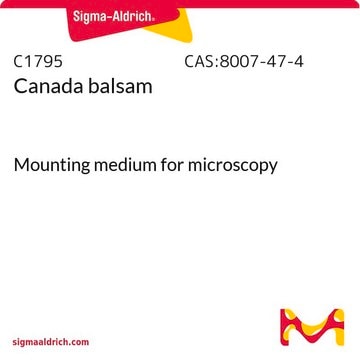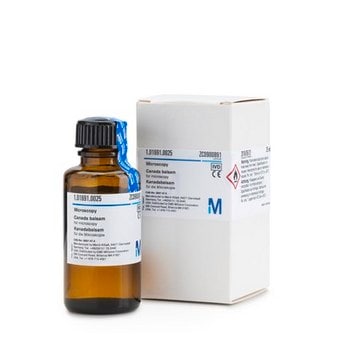60610
Canada balsam
for microscopy
Synonyme(s) :
Balsam Canada
About This Item
Produits recommandés
Qualité
for microscopy
Niveau de qualité
Technique(s)
microbe id | staining: suitable
Couleur
yellow to very dark yellow
Indice de réfraction
n20/D 1.47-1.54
n20/D 1.522 (lit.)
Densité
0.99 g/mL at 25 °C
Application(s)
hematology
histology
Température de stockage
room temp
Vous recherchez des produits similaires ? Visite Guide de comparaison des produits
Application
Mention d'avertissement
Warning
Mentions de danger
Conseils de prudence
Classification des risques
Flam. Liq. 3
Code de la classe de stockage
3 - Flammable liquids
Classe de danger pour l'eau (WGK)
WGK 2
Point d'éclair (°F)
102.2 °F
Point d'éclair (°C)
39 °C
Équipement de protection individuelle
Eyeshields, Gloves, type ABEK (EN14387) respirator filter
Faites votre choix parmi les versions les plus récentes :
Déjà en possession de ce produit ?
Retrouvez la documentation relative aux produits que vous avez récemment achetés dans la Bibliothèque de documents.
Les clients ont également consulté
Notre équipe de scientifiques dispose d'une expérience dans tous les secteurs de la recherche, notamment en sciences de la vie, science des matériaux, synthèse chimique, chromatographie, analyse et dans de nombreux autres domaines..
Contacter notre Service technique











